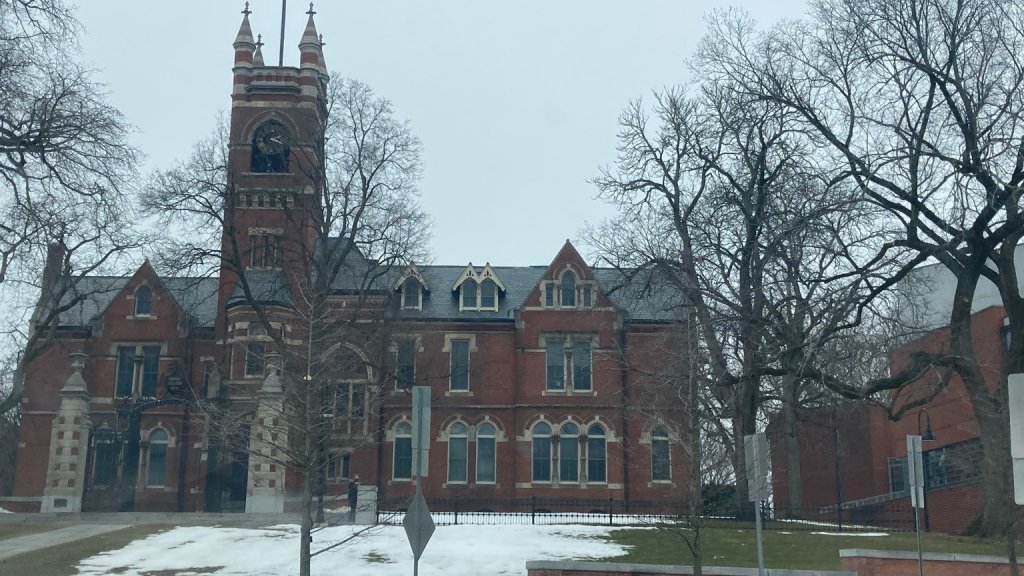
After months of debates, the Northampton Reparations Commission has made public its findings of institutions it says were complicit in financing and maintaining racist property deeds in Northampton, past and present.
In its preliminary report, the commission’s members say they have discovered approximately 240 Northampton property deeds that include or reference explicit or coded racist covenants, recorded as late as 2020. That racist language bars the sales or rentals of properties to “colored persons” and other ethnic groups — restrictions that are unenforceable after the 1968 passage of the federal Fair Housing Act and similar state laws, but which the commission said would nevertheless make Black home buyers reluctant to buy into those white neighborhoods.
“Without financing, most of these real estate transactions could not have occurred,” the commissioners write. Most of the racially restrictive language the commission found originates with two Northampton property owners, Charles Sauter and Champion Swift, and dates to a period between 1923 and 1947. Since then, financial institutions have continued to back the racially restrictive language by financing deeds that replicate the language of previous deeds, or simply reference them.
“These restrictive covenants evidence institutionalized and systemic racism that was apparently accepted by and acceptable to major institutions, e.g., banks and other lending institutions, in the city as well as prominent citizens, including lawyers,” the report reads.
The report’s list includes both local financial and cultural institutions such as Easthampton Savings Bank and Smith College, as well as multinational investment banks like Citigroup and Bank of America.
The report comes after tensions arose in public commission meetings over whether the commission should contact these institutions prior to publicizing this list of complicit institutions — and when the commissioner who compiled the research would even share it with the rest of the commission.
It appears that the commission did not contact the named institutions before releasing the preliminary report. In their most recent meeting on Dec. 3, commissioners focused on discussing community engagement efforts and filling the vacancies in the commission. Only one commissioner mentioned in passing the complicit institutions that have just been made public through the preliminary report.
“I find it fascinating and somewhat shocking that financial institutions I ascribe to have this history,” said commissioner Rachel Naismith. “It’s nice to see some hard names and facts there.”
For example, Florence Bank, a local lending institution in Western Massachusetts, has financed at least 35 mortgages with racist covenants since 1936. As late as 2018, a mortgage deed financed by the bank references “restrictions of record,” which include a 1928 deed with the specific racist language “Said premises shall not be sold to or occupied by any colored persons.”
Many older deeds identified by the commission contain various explicit or coded racist language, some specifically forbidding purchase or occupation of the property “by any colored persons.” While many recent property transfers make references to earlier deeds with explicit or coded racist language, there also exist recent deeds that directly include coded racist restrictions.
In 2015, Florence Bank and Smith College financed two separate mortgage deeds that restrict sales to or occupancy by “any person or class of persons whose ownership or occupancy would be injurious to this locality for residential purposes.”
In the report, the commission urges listed institutions to meaningfully participate in the city’s reparative efforts, which have yet to be proposed. In their most recent meeting on Dec. 3, commissioner Marsha Morris pointed out that many of the commission’s recommendations so far have been for symbolic moves, like naming streets, and stressed that there has not been any engagement with the community in generating the report and its recommendations. She urged more community engagement efforts as the commission moves forward.
Other complicit institutions listed in the commission’s preliminary report include Bank of America, First National Bank of Northampton, Greenfield Cooperative Bank/Northampton Cooperative Bank, Greenfield Savings Bank, D.C., PeoplesBank, The Smith Charities, TD Bank, UMassFive College Credit Union, Wells Fargo Home Mortgage, and others.
When asked to comment, Jacqueline Charron, the senior vice president of strategy & implementation at Greenfield Cooperative Bank, told the Shoestring that the bank “follows Federal and State Fair Lending related laws and regulations,” including the Fair Housing Act of 1968. Its most recent mortgage deed that contained racist covenant dates to 1976, which incorporated a reference to two earlier deeds that contained the coded racist language.
Matthew Bannister, the senior vice president of marketing and corporate responsibility at PeoplesBank, says that the bank is “working to uncover specifics on the transaction in question, and will reserve any comments until we can determine more.”
By the time of publishing, no other institutions have replied to The Shoestring’s request for comments.
The commission submitted the preliminary report to the City Council on Thursday. Still, commissioners did not touch on the question of how to proceed with the accountability of institutions complicit in racial harm. Commissioners Morris, Montgomery-Tamakloe, and Power-Greene highlighted the plan to fill vacancies in the commission and the need to actively engage Black community in Northampton on the sweeping report, which also touches on police and school reforms as well as efforts to preserve culture and history. They also hope to request an extension of the commission’s final report into the summer.
“If you are really serious about the research work touching our community, it’s going to take us time,” Morris told the councilors. ”We haven’t talked to working class people, we haven’t talked to the poor, I don’t know how we can even think about going forward without doing that.”
The Shoestring is committed to bringing you ad-free content. We rely on readers to support our work! You can support independent news for Western Mass by visiting our Donate page.


